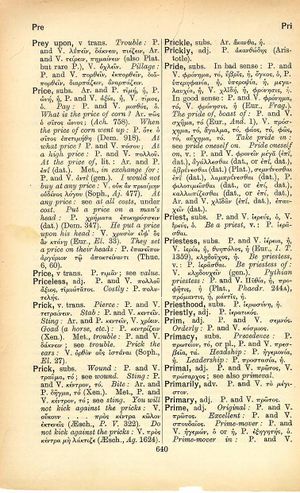pride
καλῶς γέ μου τὸν υἱὸν ὦ Στιλβωνίδη εὑρὼν ἀπιόντ' ἀπὸ γυμνασίου λελουμένον οὐκ ἔκυσας, οὐ προσεῖπας, οὐ προσηγάγου, οὐκ ὠρχιπέδισας, ὢν ἐμοὶ πατρικὸς φίλος → Ah! Is this well done, Stilbonides? You met my son coming from the bath after the gymnasium and you neither spoke to him, nor kissed him, nor took him with you, nor ever once felt his balls. Would anyone call you an old friend of mine?
English > Greek (Woodhouse)
subs.
In bad sense: P. and V. φρόνημα, τό, ὕβρις, ἡ, ὄγκος, ὁ, P. ὑπερηφανία, ἡ, ὑπεροψία, ἡ, μεγαλαυχία, ἡ, V. χλιδή, ἡ, φρόνησις, ἡ. In good sense: P. and V. φρόνημα, τό, V. φρόνησις, ἡ (Eur., Frag. ). The pride of, boast of: P. and V. σχῆμα, τό (Eur., And. 1), V. πρόσχημα, τό, ἄγαλμα, τό, φάος, τό, φῶς, τό, αὔχημα, τό. Take pride in: see pride oneself on. Pride oneself on, v.: P. and V. φρονεῖν μέγα (ἐπί, dat.), ἀγάλλεσθαι (dat., or ἐπί, dat.), ἁβρύνεσθαι (dat.) (Plat.), σεμνύνεσθαι ἐπί (dat.), λαμπρύνεσθαι (dat.), P. φιλοτιμεῖσθαι (dat., or ἐπί, dat.), καλλωπίζεσθαι (dat., or ἐπί, dat.), Ar. and V. χλιδᾶν (ἐπί, dat.), ἐπαυχεῖν (dat.).

